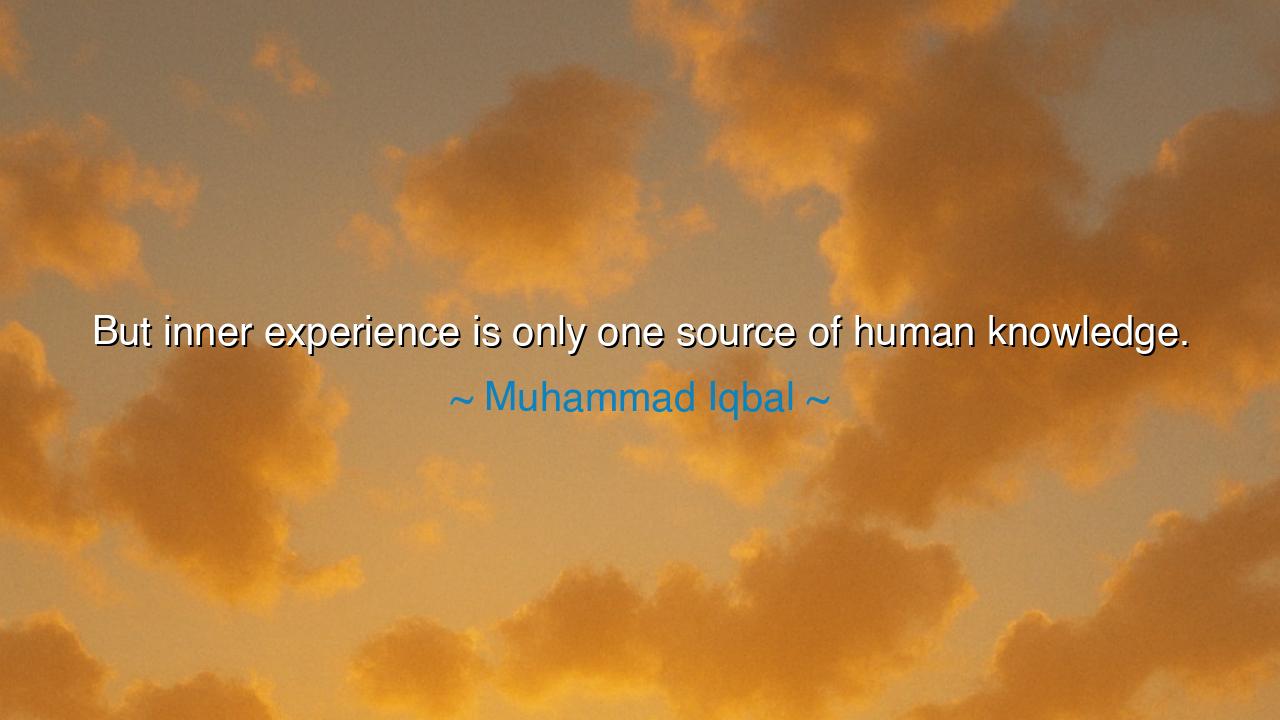
But inner experience is only one source of human knowledge.






Host: The light from the overhead lamp flickered softly, casting a warm glow over the small, cluttered room. Jack sat on the edge of a well-worn couch, his legs crossed, eyes lost in thought as he stared out the window. The world outside was quiet, almost asleep, but inside, the air was thick with unspoken ideas, questions that had been brewing for a while. Jeeny sat nearby, her fingers tracing the spine of a book, but her attention was on Jack, waiting for him to speak, sensing that the words were coming.
Jack: “I came across this quote from Muhammad Iqbal today: ‘But inner experience is only one source of human knowledge.’ It stopped me for a second. I’ve always thought that a lot of what we know comes from within, from how we feel or understand the world. But he’s saying there’s more to it than just that, right?”
Jeeny: “It’s a profound thought, isn’t it? Inner experience is a huge part of how we understand the world, our emotions, our intuition. But Iqbal is pointing out that it’s only one piece of the puzzle. There are other sources of knowledge—external experiences, the world around us, the knowledge passed down from others, from culture, history, and science. We don’t learn everything from what’s inside us.”
Jack: “Right. I guess I’ve always leaned more on the internal side of things. The way I feel about something, my personal experiences—that’s how I gauge what I know, what’s real. But this quote made me realize that maybe I’ve been limiting myself. There’s so much more to learn from the world outside of me.”
Jeeny: “Exactly. Inner experience is incredibly valuable—it shapes how we see ourselves and interpret the world. But it’s not the only way to know things. If we rely solely on our internal world, we miss out on objective knowledge, the kinds of truths that come from observation, from facts, from the experiences of others. It’s about balance—internal and external knowledge working together.”
Jack: “But don’t you think there’s a danger in relying too much on the external? If you only trust what you can see or touch, doesn’t that limit your perspective? I mean, there are so many things we feel, deep inside, that we can’t always explain with logic or science.”
Jeeny: “That’s true. There are feelings and intuitions that guide us, things that we can’t always explain in a concrete way. But Iqbal isn’t saying we should abandon inner experience—he’s just reminding us that knowledge comes from many places. We need to engage with both the inner and the outer worlds. Our intuition can be powerful, but we also need to engage with the world outside of us to gain a fuller understanding of what’s true.”
Jack: “So, it’s not about choosing one over the other. It’s about finding a balance between what we feel and what we observe. Both are valid sources of knowledge, just in different ways.”
Jeeny: “Yes, exactly. Think about it—science gives us knowledge that comes from the outside, things that are observable and measurable. But philosophy or spirituality often comes from our inner experience—how we think about our existence, our purpose, and our connection to the world. Both kinds of knowledge are necessary to understand the full scope of our human experience. Without one, we’re incomplete.”
Jack: “So, we can’t just live inside our heads, relying solely on intuition or feeling. And we can’t only live in the external world, measuring and observing. It’s about integration, combining both to truly understand ourselves and the world.”
Jeeny: “Exactly. Inner experience is valuable because it’s deeply personal, it’s where we learn about our emotions, our values, and our instincts. But it’s just one layer. The world outside—what we learn from others, from the experiences of different cultures, from history—adds depth and perspective. The more we engage with both, the more complete our understanding of the world becomes.”
Host: The room fell into a peaceful quiet, the weight of the conversation lingering between them like a new understanding, a realization that the pursuit of knowledge wasn’t just about looking inward or observing the world—it was about blending the two. Jack sat back in his chair, his thoughts slowly taking shape, as Jeeny smiled gently, knowing that they had just touched on something deeper, something that connected the individual to the world.






AAdministratorAdministrator
Welcome, honored guests. Please leave a comment, we will respond soon